The man was stranded on a yacht without power.
The RNLI came to the aid of a diabetic man suffering from severe seasickness on Saturday after his yacht lost power.
The 32ft craft was was under sail and located in the area between Askew Spit and Taylors Bank in the main channel of the River Mersey.
The National Marine Safety Boats craft Dependable was the first to respond after hearing the sailor’s request for assistance over the radio. The safety boat provides cover for the Liverpool Two development and was near enough to the vessel to respond in an attempt to be of assistance before the RNLI lifeboat arrived.
Helmsman Dave Hicks of the New Brighton RNLI said: “Once we reached the vessel our crewman Dave Davies went on board the yacht to assess the casualty, found that he had been vomiting and in such a condition that he recommended immediate transfer to the lifeboat as he was suffering from severe sea sickness and should be returned to shore as quickly as possible. On the return [volunteers] looked after the casualty, keeping him warm and monitoring his condition. We made good speed back to New Brighton beach where the lifeboat was recovered and our casualty passed into the hands of the crew of a waiting ambulance and taken to hospital.”

Merseyside Fire Brigades Marine Fire One rescue were called in to assist with returning the stricken yacht to Liverpool.
Sea sickness, particularly for someone with an existing medical condition such as diabetes can be life threatening if not treated quickly. Sea sickness can cause severe dehydration, lethargy, disorientation and loss of consciousness.
Lifeboat Operations Manager Graham Sale said: “This was the sort of rescue that our crews spend a lot of time training for and as a result the operation went smoothly. Sea sickness can be serious and anyone going to sea would be advised to be aware of the symptoms and treatment especially if anyone on board has other medical conditions.”
Related links:
Seasickness prevention and cure: the good, the bad and the dreadful
Tips for crossing the English Channel
Missing dog rescued a mile out to sea by RNLI
A missing dog was rescued by RNLI volunteers yesterday morning after it chased seagulls into the sea and swam a…
Video: all-weather RNLI lifeboat assists 94m cargo vessel
All-weather RNLI lifeboat assists 94m cargo vessel. Watch the video here.
Video: Dramatic footage captures RNLI sailboat rescue
The Yarmouth RNLI all-weather lifeboat team was called out to assist a 22ft yacht in Christchurch Bay on 10 December…






